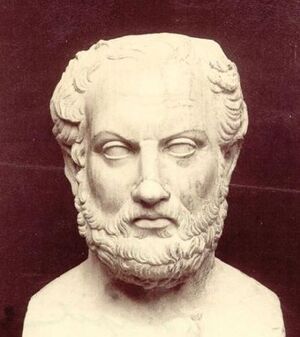Thucydides
Thucydides was a Greek historian of the fifth century before the era of the Christ. His main contribution to the world is removing the necessity to include gods in everything. Another thing for which he is famous is his lengthy narrative, The History of the Peloponnesian War.
Life[edit]
Despite Thucydides being an historian, nothing is known about his life. Some have speculated that he might have been born in Greece. What an astoundingly stupid idea! Everybody knows that Greeks never spoke Greek and that they didn't write about themselves.
The History of the Peloponnesian War[edit]
The History of the Peloponnesian War is Thucydides' only work. Indeed, it is physically impossible for any human to write more, except for a mysterious special social class named "authors" and "artists". The said book (or books, depending on if your favorite classical-library-publisher-overpricer splits the work into many volumes to squeeze more money out of you) relates the eventful events and those that are not of the Peloponnesian War, hence the name. Despite the fact that the war was waged from 431BC to 404BC, the historian decided to stop in 411BC. Many have speculated that this is due to the fact that everybody became bored. Others have put forward the idea that it was destroyed by the Athenians, who had lost the war, in an act of vengeance and in an attempt to make their defeat be forgotten. As markings and accounts of this defeat were virtually present everywhere, their devious plan failed. A few think that it ends prematurely because Thucydides himself dies in the process of writing it, even if he died more than a decade later. Evangelicals, being themselves, have agreed to agree on the idea that Thucydides is an hoax made by God to fool humans.
It is thought that the historian decided to write this narrative because he felt the war was the most important event to have ever taken place on earth. They disregard the comments made by the author that the Persian Wars, cataloged by Herodotus, claiming they are later additions. Some highly intelligent persons have discovered the solution to this problem: the passages would only have been an error associated with it being typed by an infinite number of monkeys with an infinite number of typewriters. What a most brilliant idea!
The History places an high value on eyewitness testimony, which is considered as fact. Despite this, many believe that he is the sole inventor of factual-evidence commentaries. Those people clearly show no sign of intelligence, as they themselves place no weight on eyewitness testimony, except if they are Muslims. In that case, the testimony must be of a man, or two women, in accordance to the Islamic principles of gender equality. To the great pleasure of Atheists, it does not include reference to Gods helping men. In addition to the importance placed upon unreliable witnesses, the History does not contain actual quotes, even if many passages are laid out in such a fashion. Indeed, Thucydides, wanting to make his work shorter, decided to paraphrase the sayings of people to make them more complicated and more able to inflict feelings in the readers' minds. This is considered additional proof of the historian's accuracy. In another example regularly cited by scholars, he tells his readers that democracies need leaders to be good, while adding that leaders do bad things to democracies. Because of this non-contradictory statement, many Atheists and monotheists revere him as a god.

